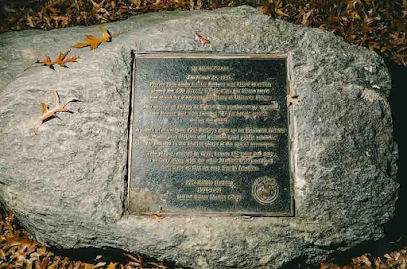The Tribute in Bennett Park to a Young Soldier - by Joe Nocera The Free Press November 11, 2023
My neighborhood in upper Manhattan surrounds a small, sweet park—Bennett Park, it’s called—that marks the highest natural point in New York City. Long ago, it was the site of Fort Washington, which the Continental Army built in the summer of 1776 only to have it captured by the British until the end of the Revolutionary War. Today, the fort’s walls are partially outlined by cobblestones, and dogs frolic around a centuries-old cannon.
In 1996 the New York City Department of Parks & Recreation added another war memorial in Bennett Park, this one dedicated to the memory of a man—a kid, really—who had grown up in the neighborhood and had been killed during World War II. His name was Emilio Barbosa. The inscription said that he was a native of Nicaragua who had lived on Pinehurst Avenue, a street that borders the west side of the park. At 17 he joined the Marines and spent the next two years manning a 20mm gun turret on the USS Nevada, fighting first at Normandy Beach and then in the Pacific theater. He died at the age of 19, when a Japanese kamikaze pilot flew into the Nevada as she bombarded Okinawa.
Barbosa’s small plaque, low to the ground and under a tree, is easy to miss. But I’ve found myself lingering over it from time to time, wondering about the man it honors—imagining, for instance, how terrifying it must have been as that Japanese plane closed in on him. My father also served in the Pacific, and decades later, when he could finally bring himself to talk about it, he said that the experience of watching a kamikaze pilot dive toward his ship had instilled in him a profound belief in God.
I’ve visited the Normandy American Cemetery in France and the Long Island National Cemetery, where the endless rows of unadorned white gravestones can be overwhelming—and can raise those same kinds of questions. How had these men lived? How did they die? What might they have done with their lives if they had survived the horrors of war?
Maybe it’s because Emilio Barbosa isn’t among the tens of thousands of soldiers buried in one of those massive national cemeteries, with nothing but a name on a gravestone—maybe it’s because his little memorial offers such a poignant outline of one soldier’s short life—that I felt I wanted to know more. And in learning more, I thought that on this Veterans Day, we might better appreciate the sacrifice he—and all the other soldiers who died in America’s wars—made for their country.
One thing I’d always wondered is when Emilio came to America. None of his descendants I spoke to knew the precise date, but the internet did—January 1929, when he was three years old. He arrived in New York from Managua with his parents and two older brothers. Why had the Barbosas immigrated? Emilio’s descendants definitely knew the answer to that: his father Jose, a prominent journalist, was fleeing the wrath of Anastasio Somoza, about whom he’d written critically. Somoza wasn’t yet Nicaragua’s dictator, but he had already amassed power and was using it to crush critics.
“He had been an intellectual in Nicaragua,” Jose’s great-granddaughter Magdalena told me about her ancestor. “Once he got here, though, he was a longshoreman.” This, of course, is the classic immigrant’s tale: you sacrifice so that your children can have a better life in America. And they did, moving eventually to a large apartment on Pinehurst Avenue in Washington Heights, where Emilio and his two older brothers went to public school, listened to pop songs on the radio, played baseball—and spoke mostly English to each other. Like many immigrants, their most fervent desire was to join the melting pot, to be as American as they could possibly be. Jose became known as Joseph. One by one, they gained their citizenship. And when the U.S. entered World War II, Jose’s three boys didn’t wait to be drafted; they immediately signed up. Joseph Jr., the oldest, joined the Army; Benjamin, one year younger, chose the Navy; and Emilio enlisted in the Marines.
Emilio was described to me as a happy-go-lucky kid who was a superb baseball player, far better than his older brothers, whom he worshipped, and who looked after him as they grew up. They tried to talk him out of enlisting—he had a year to go before he was eligible for the draft—but he wouldn’t listen. If his big brothers were going to fight for their adopted country, then so was he.














